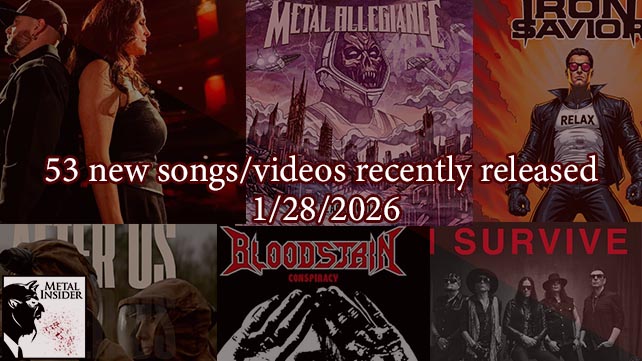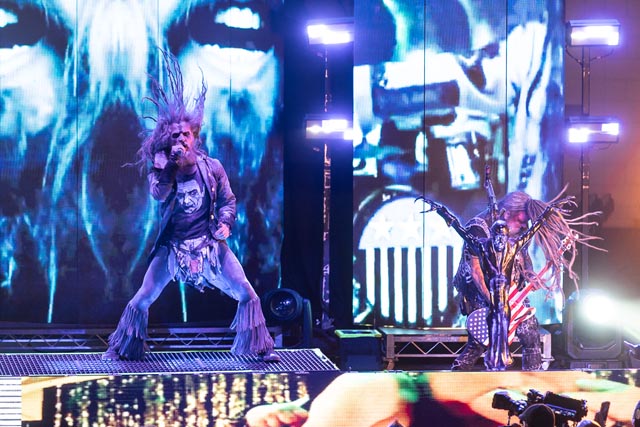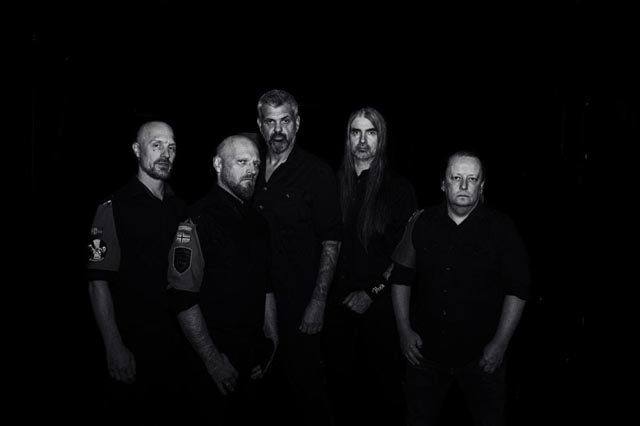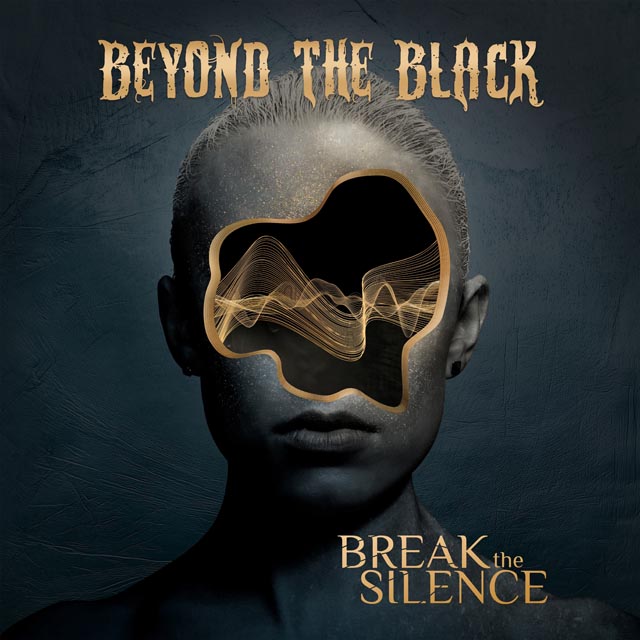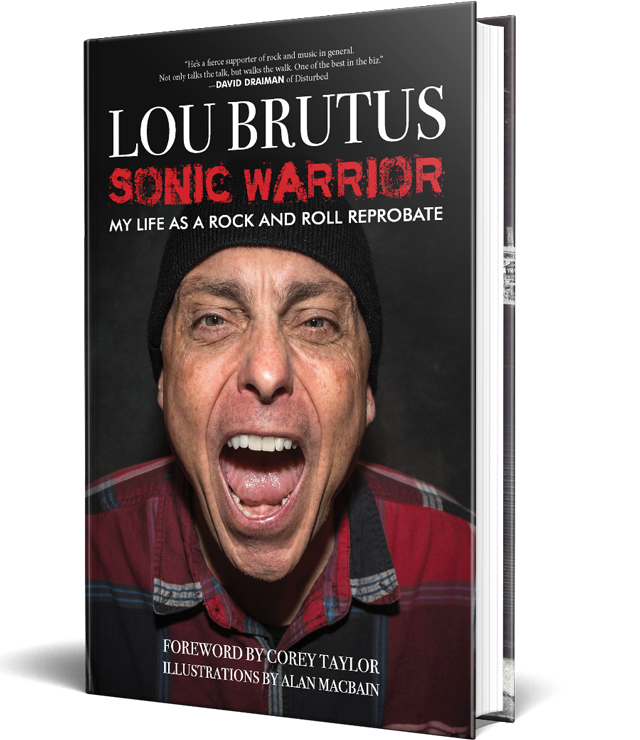
When it comes to the music industry, Lou Brutus has seen it all. And after being in the business for years, he finally wrote a book about the things he has seen with Sonic Warrior: My Life as a Rock N Roll Reprobate (Tales of Sex, Drugs and Vomiting at Inopportune Moments). Brutus is best known as the host of the nationally syndicated rock radio programs hardDrive with Lou Brutus and hardDrive XL with Lou Brutus as well as his work at Sirius XM Radio. The book is a collection of stories throughout Brutus’ storied career of simply being a music fan for over forty years, covering concerts, interviewing bands, and sharing artists’ stories, including Slipknot, Metallica, and more. Now is a great time to read the book, which you can order here. We caught up with Brutus to discuss his book, our current COVID-19 situation, and more.
What was the process like to write Sonic Warrior?
Once I got started for real, because I had a couple of false starts on the book, and when I sat down to really do it, the stories came fairly quickly. Each chapter is a stand-alone story, and I had told these stories to folks, rock star friends, industry people, and music media people for years and years and years, so it was a matter of sitting down and writing it out. I tried to keep it as close as I could to the way that I tell the stories out loud, and then I would make another pass or two or 10 after that to tighten it up and make it a better read. But, for the most part, it all came fairly quickly when I would write each chapter, but sometimes I would go weeks or months in between writing a chapter because I’ve got a pretty crazy schedule.
From one music fan the next, what are some key elements you think people should take from your book?
Well, overall, I want people to be entertained by it and I think for the most part, the chapters are funny or crazy or goofy. Some are actually just kind of nice, like the Dave Grohl chapter is just a nice look at how down to earth I found Dave Grohl to be. But even for all the craziness that can go on in the book, I honestly hope people come away with a good understanding and an honest understanding of what it’s like behind the scenes, dealing with bands, and going out on tour with groups, and covering big festivals, and all of the things that I’ve gotten to do over the course of the last 30, 40 years. The book, as wacky some of the stories get, I do go to great pains to point out that these are the aberrations, because most of the time, when you cover bands or cover shows or travel with groups like I do, it’s pretty run of the mill. Everybody is there to do a job and it’s a business, and I point out over and over again, backstage is normally the most boring place to be at a concert. It’s just tour managers screaming into fucking telephones. But once in a while crazy shit can happen, and those tend to be the chapters that I write about. They’re far more interesting than, “I sat around on road cases staring into my iPhone all day until it was time to introduce the band,” you know?
I actually liked the structure of the book, how it began with introducing the roles of industry to leading into your own story. What caught my attention a lot was in the preface when you mentioned your father’s advice to be the pointer. How does that advice still hold to you today?
It informs everything that I do. My dad really nailed it all those years ago. So that’s literally why the book starts the way it does. The other thing that sort of touches on the same vein in the book is that I often refer to myself, when people ask me what I do for a living, I just go, “Well, I’m a professional music fan,” because I just go to concerts and I still memorize liner notes. It’s the same shit I’ve been doing since I was 12 years old. But America being America, for all its faults, if you’re willing to work hard and you get lucky, you can make a living doing anything it is that you like in this country. So, yeah, to this day, I still think of myself just as a pro music fan or the pointer. When I’m on the air, I point people to good music and great new bands. When I’m on stage, I point at the group coming out. I point out other cool things in the media for people, and that’s really all the job is. It’s part of the reason there’s a short lyrical quote at the beginning of the book, and it’s like the most obscure song on the planet, but it’s one that I really love a lot and I think is meaningful to the content of the book and to my career.
The song is from a fellow named Neil Innes, who most famously worked with the Rutles. He was the Rutles along with Eric Idle. He also worked for years as a pseudo member of Monty Python’s Flying Circus. And the song is My Little Ukulele, and the passage Neil allowed me to use. I got the confirmation from him just about a month before he passed away. The lyric is, “All the world’s a stage, they say, and I’ve seen many things, standing with my little ukulele in the wings,” because I’ve been at all these huge things and historic events, and I’ve been all around the world with all these bands, but always as the guy standing off in the shadows. So I thought that was the perfect lyric to go to. And I’m glad you brought up the, I think I call it the overture in the book, and it literally breaks down paragraph by paragraph the main jobs that you see in the music business, and there’s lead singer, and there’s bass player, and there’s tour manager, and there’s roadies, and there’s groupies, and record company people, and hopefully they’re funny descriptions.
They’re hilarious.
Thank you. That makes me feel good. But also I hope you found them to be brutally fucking honest descriptions of what each person, each man or woman’s job entails because, A, I felt it was a good introduction to the book and to this world, but it also made the rest of the chapters easier to write because once you lay out who does what, you don’t have to explain it later. When somebody who might not know a lot about the rock music world knows what a tour manager does, well then I can mention tour managers in every chapter, and I almost mentioned them in every one. But it sort of lays the groundwork for what’s coming later. So it serves a few purposes. It’s informative. Hopefully, again, it’s funny, and it also sets up things for later in the book. So it just kind of worked out that way.
I thought about how you wrote about the lead singer and guitarist, how they’re kind of like always battling for the spotlight.
Was I lying? Was I lying?
It was so funny, and that’s why the rhythm guitarist has to keep up between the two, and I just thought that was really funny but true at the same time.
Yeah, and, again, these things, they’re not true in every single case.
No, of course not.
But for the most part, it’s pretty on point. And it’s funny too because folks like yourself who are journalists and also the band members I know, that’s the one section that they all bring up. They’re like, “By the way, thanks for giving away all the fucking trade secrets to everybody.”
Yeah, you caught me. Ha! What were some challenges for you to actually get this book made?
One thing was just finding the time. I’m lucky to be busy, and I’ve worked multiple jobs since I was 12 years old, so finding the time to do it was really the most challenging. And also, for as tough as the music industry is, and it’s getting tougher by the day given the situation we’re in, the publishing world is even tougher. Selling physical books is a pretty tall order, but I was glad to land with Rare Bird Lit. They do a lot of music and art-related stuff, so it seemed like a good place to be. And they let the book be the kind of book I wanted it to be. Some other publishers had come to me and said, “Well, yeah, we like this story and this story, but we only want hard rock and heavy metal,” or, “We only want classic rock-leaning things,” and I’m like, “Listen, I’m doing this shit for 40 years, and I think if somebody’s a music fan, they’ll read through chapters of bands that they’ve only heard about even if they’re not a huge fan,” because I think even though the chapters are all stand-alone stories, taken as a whole, I think they give you a really good, or at least I hope they do, give you a good idea of what the industry has been like, what it is, and where it may end up going. So finding a place that would let all of these different artist stories live in the same place, that was kind of a challenge too.
But through it all, there were a number of friends and a lot of music people, rock n’ roll people I know, who were really on me to write the book, and I’ve mentioned him a lot, because he deserves it, Corey Taylor, who wrote the forward, who, again, is just a phenomenal author besides all the other insane shit that he does. He was one of the folks from the get go, from the first time we met, which is more than 20 years ago now, he’s been on me, “You got to write a book. You’ll write a great book. It’s going to be a fantastic book. You tell these stories great.” He just stayed on me, and I think if it were not for him, and there were a few other people that I know, but, really, mainly Corey who just stayed on me, like, “Dude, you got to do the fucking book,” and that’s why he ended up doing the forward. It was one of these times where he’s like, “Where’s the fucking book?” And I’m like, “Write a fucking forward for me. I’ll get a fucking book deal.” And he wrote the forward and wrote I think a really good one. It’s a bit brutal about me, in a good way. But yeah, yeah. Finding time and then finding the right tone for the book and the right place for the book. Those aren’t things that happen overnight, so…
They’re not easy to come to, but once you get the flow, it doesn’t stop.
Yeah, and that was part of it, because a couple of times I started to write stuff and I kind of put it away for a long time. And when I really started to write the book in earnest about four or five years ago, I had to figure out what kind of book I wanted it to be. And then I thought, “Okay, they’ll be standalone stories.” And what’s the tone of the book? Well, I wanted it to be sort of funny and goofy. It’s rock and roll. It’s not incredibly serious. I also wanted to make sure that I wasn’t trashing anybody in it because I’ve certainly seen a lot of shit go down. And I don’t mind stories that are crazy or fun, and I don’t mind if I look like an oaf, but I didn’t want it to be the kind of book that was talking shit about people because a book like that would probably sell more, but I didn’t want to be an asshole, and there was no reason for me to be an asshole. I thought, “I’m doing this for 40 years. I’ve had so much crazy shit happen around me. I could write a fucking awesome book,” I thought, without doing it at the expense of others. And if it sells less books then so be it. I don’t give a shit. I’d rather be able to look at myself in the mirror.
That’s always a difficult choice to make, I believe, but I think that’s the right path to go to.
Thanks. Yeah, yeah. And there’s plenty of trashy books that people write and good for them. But that’s not what I wanted to do.
I actually wanted to talk about our current situation. There was an article about the state of Missouri, that they can have concerts back. And from your experience and with this new normal we’re living in now, when do you think it’s safe to bring concerts back?
I honestly don’t know, and I’m hesitant to speak about it because I’m not a doctor. I do try to stay informed. I read up. Everyday, I look at places that are getting hot and cold with things, county by county. I go to the sites for the Mayo Clinic and for Johns Hopkins because I find them really informative, and you’re not getting a slant of some kind from them. You’re just getting good medical information. There’s a number of things really that need to happen. One is not only do the orders just need to be lifted, but people need to feel comfortable going out, and what’s the criteria for that? Does everyone wear masks and gloves when they go to a crowd? Are people going to be seated with two or three empty seats in between them? Are they going to put up a grid down on the floor of general admission shows and you’ve got to stay inside your portion of the grid to maintain social distance? This is devastating to what’s happening to the economy, in particular as it pertains to folks like you and I, the live music industry. But if they relaxed stuff too soon, does that mean there’s going to be an even worse second round of infections and deaths, and will that set things back even further? These are all the things at play. I don’t have an answer. I don’t know. I just hope that it’s sooner rather than later. And I think I’m like anybody else. One moment I’m super pessimistic and I think, “We’re in the fucking Twilight Zone.” Then I think, “Well, you know what? They’ve never had all of the smart people in the sciences and medicines working on the same problem before, so maybe that’s going to speed things up in terms of finding a way of alleviating the chance of death and serious sickness when people get it. That’ll likely be first. Then of course there’s a vaccine, and that hopefully will help things. So my hope is maybe the time that those things normally take to get done will be lessened.
There are two other things to take into consideration. One is whoever figures this out is going to make a billion, trillion, million bazillion fucking dollars, so that’s a good driving force. But also more important than that, you have to remember that much like people are driven to create music, even if they’re not famous, we all know people, we have friends and family members who are driven to create art. And in the same way, there are people in medicine and in science who are driven to do what they do, which is fixing problems and figuring out genomes or whatever the fuck it is that they do, because I don’t understand it, but I’m glad that there are people who are driven to fix things like that, and right now, all of the people who are driven in the greatest of ways are looking to solve one of the most serious problems humanity has had in our lifetime in the last century, in terms of health. So I hope those people can pull our fat out of the fires sooner rather than later. I hope that answers your question. I know in some ways it did not, but those are all the kinds of things that I’m thinking in the back of my mind with the end result being I get to walk back back out on stage and introduce the band again.
It’s an honest answer. I mean, none of us know when it’s safe or anything about this. We’ve never been through this before.
Yeah, there’s really no one alive who remembers what the flu epidemic was like shortly after World War I, which is a little over a century ago. And since I’m a little kid, and I read a lot, I read all sorts of stuff, but at times I would gravitate towards disaster reading and read about horrible hurricanes and tornadoes and pandemics, and this has happened before and we’ll get out of it. It’s just, boy oh boy, I hope it’s sooner rather than later.
What advice do you have for people trying to get their foot in the door into this industry?
Go back! It’s a trap! We’re all done for! Save yourselves! It’s fucking horrible! Help! That’s honestly the first advice I give everybody. I often get asked by people for advice or they’ll ask about things that I do or I’ve done, and that’s certainly very gratifying to be asked. They ask, “What’s the secret?” I’m like, “Listen, there is no secret.” Be knowledgeable about what you’re talking about. Do a lot of research before you go to speak to somebody or get involved in anything. Be on time. I actually point that out in the book, amongst other things. You’d be shocked how many people don’t show up on time for things, and it’s rule number one. Everybody’s on a tight schedule in any business, especially in the rock and roll business, especially when you are talking about doing things at shows. Everybody is just on this hyper tight schedule. So be on time. Also, be polite and respectful to everyone you meet. And you should do that everywhere in life anyway. Everybody deserves respect. Everybody deserves respect. When you show up at a gig or on a tour, be nice to everybody. There’s no reason to be nasty to everybody. I try and go out of my way to talk to everybody that I see. And that’s from the lead singer of the headlining band to the tour personnel, and the local crew, the catering people, the janitorial staff, the bartenders, the waiters and waitresses. I’m a chatterbox anyway, so I just like talking to people, and you just never know when you’re going to learn some interesting bit of information that might pay off that day in the interview or you’ll be able to use that knowledge later. But so many great things grow out of being nice and respectful to everybody. And listen, I know for a fact I have shitty days like other people do, and sometimes I’m sure I come off as a jackass, but, for the most part, I really, really try to be good to everybody, because I just like talking to people. I always have. Even since I’m a little kid, I found striking up conversations to be one of the easiest things in the world. I find getting out in front of people and speaking is one of the easiest things in the world. So, those are the real secrets. It’s just be nice, be respectful, be on time. Be sober, too. I see people who show up to host shows and they get blasted before they go on stage and they look like a fucking idiot. Listen, you’re there to work. So if you’re going to do some drinking and or partying later, do it after everything is done and nobody’s around to sit it. That’s the best way to approach it.
Is there anything else that you want to say or add about your book?
I’m just really glad that the reaction is to the way that it is, because when the release date was fixed last year, I knew that the book would be coming out in the middle of an election cycle, and everyone’s at one another’s throats. And I thought, “Well, I hope that my book landing in the middle of all this will give people a break, and it’ll give them a laugh, and it’ll make them think about music and concerts, and forget about politics and societal ills for a little bit.” And I’m not saying people do not need to be informed. I think it’s terribly important that they remain informed. But if you don’t take a fucking break now and then, it just drags you down. So I had that in the back of my mind. It didn’t change how I wrote the book, but it changed how I thought… what is the world going to be like when the book lands?
And then, just as we’re gearing up a couple of weeks from release and the books are being sent to the warehouses and all this stuff, and I’ve got book tour dates lined up, then we hit this pandemic nightmare. And at first, and I still am really bummed out that the book landed in such a world and we had to cancel a lot of the press plans, but in some ways I think it’s helped people. I think it’s given them in the way I thought it would give them a break from an election year, even more so it’s given them a break from the pandemic, and I can’t even count the amount of people who have reached out one-on-one to me, “Oh my god. Your book saved me. Your book’s keeping me sane. It’s great to read about concerts and rock and roll in the middle of being cooped up in my house or worried about my family or my finances,” or whatever it is. So, along with people enjoying the book on its own merits, which is awesome, the fact that it’s giving so many people a break from the horrors that they’re going through now, that makes me feel extra good. So, it’s not the world I thought the book would be coming out in, but if the worst thing that I have to deal with through this shit is book tour dates are postponed for months or a year or whatever it is, man, I’m a pretty lucky guy. So, I’m glad to have something a little fun to do amongst all my other media duties, talking about the book while this thing is going on. It’s helped fill up my time as I’m eight weeks now locked up.
It actually is definitely a good time to read your book and stay away from the news 24/7. It adds a lot of anxiety, seeing all the arguing.
Yeah, and, again, I firmly believe that you have to stay informed to be a good citizen and a good voter. You have to have good news sources and good information sources. But if you just wallow in them 24/7, it is the worst thing for your mental health. So take a break and read about me throwing up out of helicopters at Live Aid, or throwing up on my sister’s boyfriend at my first concert, or going into the Arctic with Metallica, or any of the other adventures in the book. It should be a good break.







